So for the last seven months I’ve been baking bread pretty much every week.
It started on Lammas, also known as the Loaf-Mass, when Persephone and I baked mother and daughter loaves.
After that I decided to keep baking for a while. Xy and I are in the habit of making sandwiches for lunch at our respective workplaces, so my main aim was to make decent sandwich bread.
Based on a vague recollection, I decided to buy the Tassajara Bread Book. I baked through most of the recipes in the chapter on yeasted breads. Oatmeal bread, summer Swedish rye bread, cheese bread, millet bread. The author, Edward Espe Brown, advocates a sponge method which I found generated decent and consistent results.
Soon I was looking at some of the other chapters. The section on sourdough looked intriguing, but also suspiciously easy. Too easy. I looked online and quickly got intimidated at the prospect of starting my own starter from scratch. So I put out a plea via Twitter, asking if any locals wanted to hook me up with a few ounces of the good stuff. No dice.
Then, a month later, by strange coincidence, Michael Pearce contacted me. He wanted to know if I was interested in some sourdough starter. He never saw my request, but he noticed the photos of bread I’d been posting.
And so I found myself with a batch of starter — but more importantly I found a mentor.
Under his tutelage, for three months I baked nothing but sourdough. Now I seem to be settling into a pattern of baking with natural leavening one week and using commercial yeast the next. I’m now working my way through Bread by Jeffrey Hamelman.
There have been some mishaps along the way, hilarious in retrospect at least. I’ve managed to destroy a ceramic casserole, explode the lightbulb in our oven, burn myself a few times, and of course there was the time I put waaay too much cumin in the dough. Yet despite all these pratfalls, only that cumin batch has been marginal in terms of edibility.
Whenever possible I try to involve my daughter, though as I’ve fretted more over technique I haven’t always done a good job of keeping her interest.
Baking bread is mostly a matter of technique, and I feel like I’ve come a long way. It’s a trip to look back at my first naïve efforts and compare them to what I’m doing now.
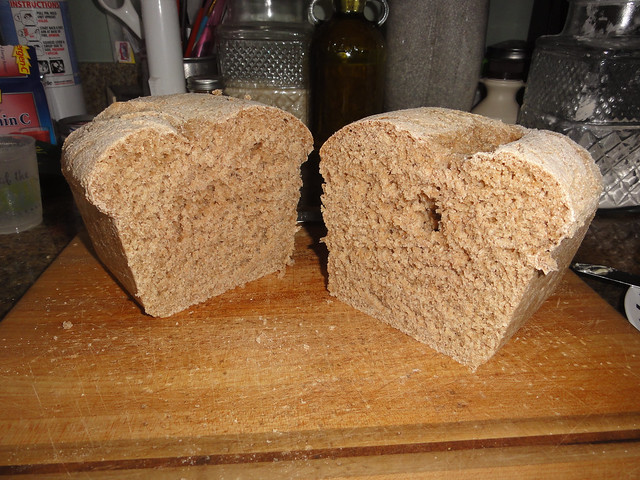
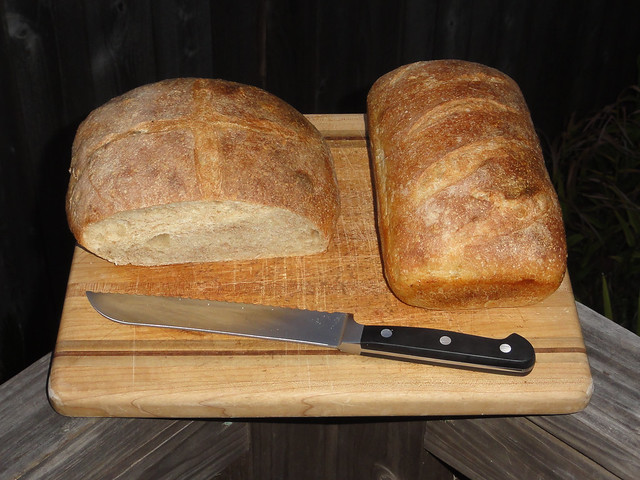 But perhaps the prime value I derive from baking is humility. I’ve learned a lot, but there’s always more to learn. No matter how much better I get there is always room for further improvement. And my mentor, who has been baking for well over a decade, feels the same way. He bakes some of the most excellent bread I’ve ever had the pleasure to eat. Yet he tells me, “I’m still waiting to figure out how to bake bread.”
But perhaps the prime value I derive from baking is humility. I’ve learned a lot, but there’s always more to learn. No matter how much better I get there is always room for further improvement. And my mentor, who has been baking for well over a decade, feels the same way. He bakes some of the most excellent bread I’ve ever had the pleasure to eat. Yet he tells me, “I’m still waiting to figure out how to bake bread.”
In some ways, to bake bread is to be an eternal novice.
In fact, I’ll go even further: It is a spiritual practice and a religious ritual.
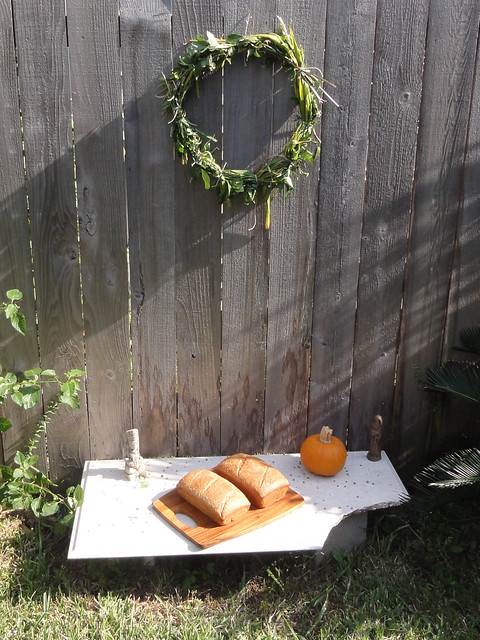 It may not look like ritual to some eyes, but to me it is. I suppose intention is a big part of it. As Waverly Fitzgerald writes at the School of Seasons:
It may not look like ritual to some eyes, but to me it is. I suppose intention is a big part of it. As Waverly Fitzgerald writes at the School of Seasons:
Bake a loaf of bread on Lammas. If you’ve never made bread before, this is a good time to start. Honor the source of the flour as you work with it: remember it was once a plant growing on the mother Earth. If you have a garden, add something you’ve harvested — herbs or onion or corn — to your bread. If you don’t feel up to making wheat bread, make corn bread. Or gingerbread people. Or popcorn. What’s most important is intention. All that is necessary to enter sacred time is an awareness of the meaning of your actions.
Making bread is a fun activity I can do together with my family, for my family. It connects us to history, culture, science, and the natural world. (Not wild nature, obviously, but nature nonetheless.) And at the end we have a delicious and healthy food. More than just a treat, it’s the very stuff of life.
When I bake bread I feel that sense of reverence and awe and connectedness and wholeness so often described as spiritual or sacred. Not always, not automatically. But that is my intent. Like my levain, it requires regular feedings for renewal.
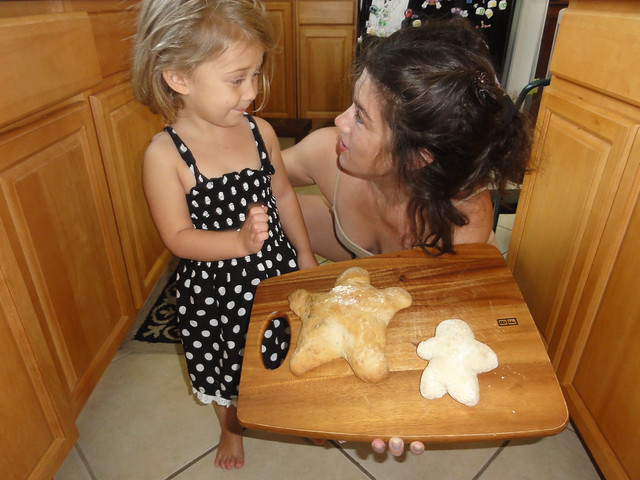
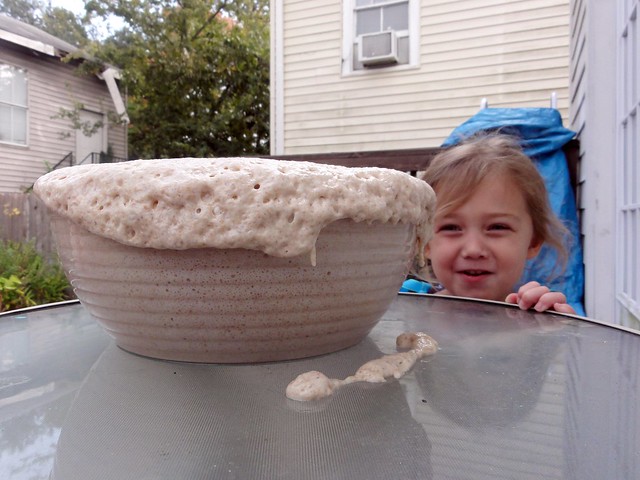
There’s a “J&B Get Baked” joke here somewhere, I know it.
Find a copy of H.E. Jacob’s “Six Thousand Years of Bread: Its Holy and Unholy History”. It’s a great read.
bread is a great teacher , as is all baking. it teaches you not to be anal about life,
enjoy the process.
ya you fuck it sometimes but you learn from it.
we made an apple pie last sunday that took four hours to make. the dough was pretty much a pastry dough and well worth it. i learned a lot about a dough i never work with and got to enjoy a great pie also.
right now im digging a book called beautiful breads by margaux sky.
it’s a good one for “sammich breads” as we say down here.
please keep posting your baking diarys. i love learning about this mess, plus it cuts down on my trial and error.
your pal, rickngentilly.
Bart,
When you lived in Bloomington, did you ever buy the Brownberry Natural Wheat Bread from Kroger or Marsh? The loaves were smaller than most and much more dense and the taste was excellent. Can’t get it in NOLA and we usually have family bring loaves when they visit from up north. I’ve tried for a couple of years to find a bread recipe that matches the Brownberry. Have come close but if anyone is familiar with this bread and knows a recipe that comes close to it, send it on…
You should try again to get your own starter going. This is an excellent and easy method I’ve used to great success:
http://slice.seriouseats.com/sourdough/
Aaron: Ha!
Celeste: I’ve made a note of it.
Rick: Sorry to say this will probably not turn into a baking blog, but I will continue to add pix here: http://www.flickr.com/photos/editor/sets/72157627930905040/
Chris: Brownberry, that sounds familiar. I’ll run it by Xy.
Garvey: Thanks, I may just do it. But as I’ve got a functioning starter now is there any advantage to starting anew? Just for fun?